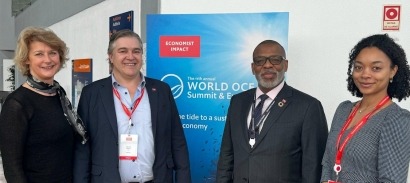
This concept, which takes a concierge approach to the approval process, is being used as a template for other islands by the United Nations' Small Island Developing States organization for renewable energy transition, SIDSDOCK.
“We have developed what we call a regulatory sandbox for our energy transition to be part of the energy innovation that is necessary for islands to transition from fossil fuels. We've got a partner in that, a company called Seabased,” Roban said.
“We (Bermuda) developed our own method of attracting innovation in the space…. We are very much on the way to successfully deploying the first utility-scale wave energy project in the world, but I'll scale it down to the region. “We are sharing this experience with the United Nations and they're using it to deploy a similar project in Tonga.”
It is also being considered in other islands of the Caribbean.
Islands depend on imported fossil fuels, exposing them to an unsustainable system with price shocks, struggles to maintain foreign currency reserves, and exorbitant electricity costs. Many don't have the space on land for large scale utility-wind projects that are attractive for global investors. As small nations, they lack the muscle to individually attract the capital to drive forward the ocean renewable energy that would allow them to transition away from fossil fuels.
Furthermore, huge portions of the small amounts of land they do have are projected to be underwater within the century due to rising sea levels. Together, islands manage about 30% of global ocean real estate, making them large ocean countries.
Ocean energy technology from companies such as Seabased provide innovative, viable solutions to consider for islands. But these emerging technologies need more support in the form of subsidies, credits, and investment to deploy them commercially to the thousands of islands that depend on them.
“We have conducted feasibility studies on putting wave energy parks in several SIDS and are finding our solution would work to help many of them transition to blue energy,” said Seabased VP of Business Development Marcelle Askew who gave a presentation on the Bermuda park along with Minister Roban. “Islands really are on the front lines of climate change and Minister Roban is recognized as someone who is leading innovation not only for Bermuda, but with all islands in mind.”
Minister Roban and other island representatives agreed that, regardless of their location, islands share the same issues and face the same challenges and need to collaborate on solutions that they can all benefit from. They are ideal for testing innovative technologies for the marine environment.
Often, said Ilana V. Seid of the United Nations' Permanent Mission to Palau, the solutions proposed are too large for islands and islands need to share knowledge.
“One of the things we are working on at the UN is a SIDS framework…. Hearing about Bermuda's initiatives in wave energy, there aren't that many viable energy resources in the ocean that are sustainable. So if there are such case studies in small islands we should really share that and implement that across islands.”
Already, UN SIDSDOCK is liaising between Seabased and other small islands and the company has signed an MOU with the island of Tonga.
Part of the problem however, is funding. Bringing a new renewable to commercial viability is expensive and needs a lot of support. Seid recommended ideas such as an island bond or microfinance initiatives with commercial lenders that could help islands achieve their goals, which would also bring ocean energy to the rest of the world.
"There needs to be a rethink and redesign of the global financial architecture. As has been called for by the Bridgetown Initiative. The current system isn't satisfying the sustainable needs of developing states, islands or coastal communities," Roban said.
“At the core of the issue is that the financial models that have been traditionally used are not suitable for the financial needs of the developing world,” Roban said.
“They're based on principles that were designed for larger jurisdictions by a world that, at that time, was mostly white male contributors. Now we have a bigger world, which is not, and the needs of the Global South are identified in that.
“We need to change the model so that we can devise financial products that actually speak to the needs of the energy transition.”
“We just want to be able to be sustainable. “We just want to be able to be prosperous and we want to be able to take care of our people and their needs just like everybody else.”

